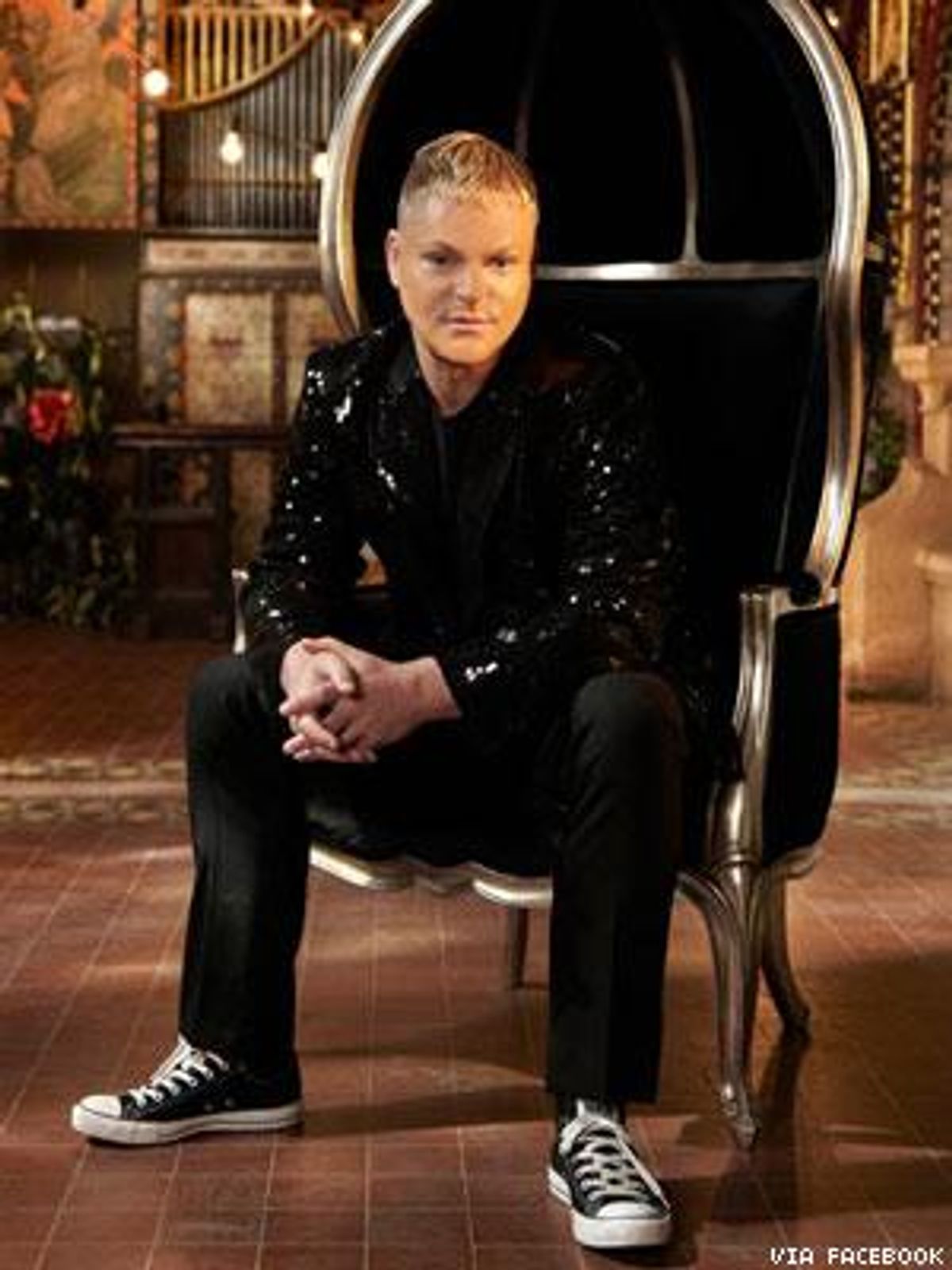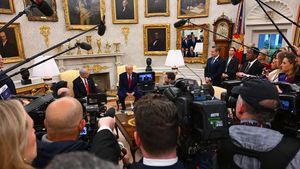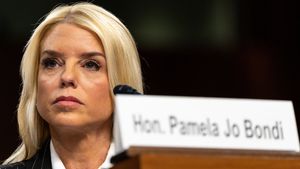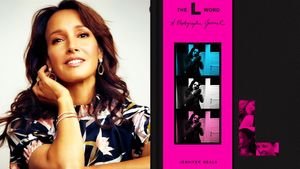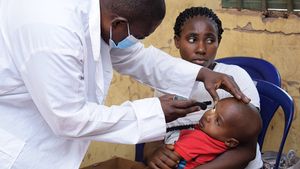Editor's Note: To celebrate the release of Erasure's 15th album, Snow Globe, we dug up this classic interview with Andy Bell, the HIV-positive half of the 28-year-oldl iconic synth-pop duo. When this interview ran in 2004, Erasure had already had dozens of number one hits (like the pop athem “Who Needs Love (Like That)”), sold millions of records, and become music legends. But Bell, had just come out as HIV-positive, something he had waited six years to do. Nearly a decade later, and 18-years after his diagnosis, it's great to see Bell is still healthy, and still doing what he loves to do.
In the waning days before Christmas 2004, Andy Bell, front man for the hugely successful techno-pop duo Erasure, decided he had finally had enough after hiding a secret for six years. After a tentative discussion with some European journalists, Bell boldly revealed in an announcement on Erasure's Web site that both he and his boyfriend of 20 years, Paul Hickey, are HIV-positive.
"Being HIV-positive does not mean that you have AIDS," Bell wrote on ErasureInfo.com. "My life expectancy should be the same as anyone else's, so there's no need to panic."
Bell further noted that he planned to continue his music career with Erasure and that he was looking forward to the duo's world tour, which began in late February and will make stops in 10 U.S. cities beginning in April. Less than a month after Bell's declaration made him one of the world's highest-profile musicians ever to make such an announcement, the pop star, who turns 41 in April, was surprisingly candid in an interview with HIV Plus about why he hid his HIV infection since 1998, when he tested positive following a bout of pneumonia; what led him to finally talk openly about his life with HIV; his plans to promote AIDS awareness; and "shockingly to many people" how he might have actually sought out HIV infection after his partner tested positive.
But Bell is showing that he has since gotten a handle on life since his diagnosis. As he finished off writing to his fans in his Web announcement: "There is still so much hysteria and ignorance surrounding HIV and AIDS. Let's just get on with life— i.e., making music, doing a live tour, and generally having a good time. Lots of love, Andy."
You essentially came out as HIV-positive to the world with your posting on your Web site. Why did you decide to reveal your serostatus the way you did?
I had been thinking about it for a while. I was kind of encouraged to do it about two years previously but didn't feel ready to. I was a bit scared. My boyfriend found out he was HIV-positive in 1990. At the same time, some guy had stolen my jacket in a nightclub in London, and he was caught using my credit cards. He had AIDS, so I let the whole thing drop. But he was saying to people that he was my boyfriend and that I'd given him AIDS. He called up a national newspaper here in London, and they were going to run a whole story on the guy. However, I had just had my appendix out and had been tested for HIV and was negative. My boyfriend — I was out of the country, actually — ended up taking the test certificate down to the press office. I was a bit nervous because of that episode happening about 10 years ago, which in the U.K. was almost a witch-hunt seeking out people with AIDS. So I had all these things swimming around in my head. I never felt comfortable with holding things back, though. I felt I was making up excuses. So I thought now would be as good a time as ever.
You first told a Finnish newspaper about having HIV. Did they ask you about it or had you chosen to talk about it with them first? Actually, I told a few journalists a few years ago, and it was up to their discretion either to print it or not. And they didn't. This time, I had spoken to a few German newspapers, The Guardian here, and others, and he [the reporter for the Finnish newspaper] was the first to put it out there.
Why did you decide to talk widely about being HIV-positive via your Web site instead of, say, an interview with the BBC or one of the U.S. entertainment programs?
It's always the way [Erasure partner Vince Clarke and I] have done things; we have never been that big in newspapers or anything. It just seemed the natural way'rather than making some big media announcement.
You found out you were HIV-positive 6 1/2 years ago. Why did you wait so long to disclose your status?
I didn't feel I was ready, really. I wasn't freaked out about it at the time. [I was worried about the earlier incident I mentioned. Otherwise,] it was just one of those things. My boyfriend was quite freaked out when he found out that he was. Then he wouldn't have sex with me anymore. I thought, I'm going to go out and do what I want to. I felt like [contracting HIV] was a bit like testing yourself. It was a bit like belonging to a group [I felt left out of] like being gay in the first place, being on records, experimenting with drugs, being HIV-positive kind of peer groups I thought I wanted to belong to. But only by becoming part of the groups did I realize I was just me still.

Andy Bell and Vince Clark today, 28 years after they became Erasure
Were you deliberately trying to get infected with HIV? Did you think you would find some sort of better support system or feel a part of a specific community if you did?
Yes, with an HIV-positive peer-support system. Well, I don't really belong to any groups or anything like that. I talk amongst my friends and how they're dealing with it. I have regular checkups three or four times a year, have a good talk with the doctor. [Editor's note: Bell told the London-based Times Online in January that his desire for HIV infection was "probably from self-loathing," and he attributed the same feelings to having contributed to his decade-long cocaine addiction.]
Do you have an open relationship with your boyfriend?
Yes, but it's very one-sided, mostly on my part.
But you weren't using protection with other people?
I did, but not all the time. I was traveling around, and sometimes I'd get a bit drunk and stuff. No, I was not taking precautions all the time. The boundaries were quite blurred.
Was it difficult for you keeping your HIV diagnosis private for the past 6 1/2 years?
I talked to my friends about it, quite a few are [positive] as well. Going out, when I meet people, if I see them more than once, I'll tell them I'm positive. It wasn't a big secret or anything, but it wasn't public knowledge.
Paul Hickey, your partner of 20 years, is releasing a book that will talk a bit about both of your experiences in fighting HIV. Why did he decide to write about that subject?
He was shocked at how blunt the news [that he had tested HIV-positive] came from the doctor. He was going to have a face-lift when he was 40 years oldm — in 1990 — and the doctor said, "I've got some terrible news for you. You're going to die." Then Paul had a stroke in 2000. We're not sure if it was HIV-related or from an infection after a second face-lift. He had planned to write the book about the face-lift, but when he had the stroke he wanted to write about our history and the time leading up to the stroke, which included living with me. [Ed. note: Hickey died in 2012 after a long illness.]
Do you have any apprehension about the book?
I think I'm most apprehensive about talking about the amount of money we spent on drugs! No, I think that it's really about Paul being honest. It's due out later this year. The working title is Happiness Is the Best Face-lift, after the Joni Mitchell song. [Ed. note: The title was changed to Sometimes: A Life of Love, Loss & Erasure and the book can still be found on Lulu.com.]
What did you think the reaction would be when you finally did decide to disclose your status— and has it been what you expected?
I was quite nervous about the press thing. I thought it would be more out of control than it was'kind of having the press people waiting outside my door. But there was none of that at all. I had told my family about two years ago. When it was printed, my sister sent me a text message saying, "I read a story about your HIV in the paper." It really seems all quite calm.
How about the reaction from your fans?
I haven't been looking on the forum on the Web site, but I've heard a few of them were quite upset, some saying that because you're HIV-positive, you're not going to last very long. But it's nice to be living proof that it isn't so.
Do you have any worries that you are going to be known now more for being HIV-positive than for your music?
I suppose the gay thing was one thing. Now this! As long you love making music — I love singing and performing — it all falls into place, really.
Have you faced any negative reactions linking the fact that you are gay with being HIV-positive, along the lines of the ultraconservative opinion that you deserve HIV if you are a sexually active gay man?
I haven't had a lot of that — yet. But I've had weird reactions before about being gay. They've been all over the place. We were performing with David Bowie in S'o Paulo, Brazil, in 1998, and we were the last band on. They all started yelling and throwing water, things like that. Luckily, I was not hit. It was like there was a force field. But here's the thing: Being totally honest, in some naive way, is the best protection you can have.

Bell with Clark in the 1990s
When did you tell fellow Erasure member Vince Clarke that you were HIV- positive?
He knew when I had the pneumonia. Anyway, he knew because my Paul was going through it all with me. I always felt like I wasn't going to die, but Paul was quite panicky. He called everyone up at the time.
Has it been difficult talking about such personal topics — your health, your sex life — with the media?
It is a bit weird, I think, especially talking about your health and stuff. I also had two hip replacements last year. When someone comes along and asks what you've been doing the past three years, you kind of have to tell them.
You are planning a major tour in support of your new CD, Nightbird. Are there any worries that such a rigorous tour might be hard on your health?
No. I did the last tour [for Cowboy, in 1997 and 1998], and that was fine. We did a few other gigs too. I'm sure it will be all right. I'll be looking after myself, getting plenty of rest, all the usual things. Actually, I'm quite looking forward to it.
Your two hip-replacement surgeries were because of pain you had been experiencing. Were those linked to HIV infection?
It could have been. I've heard it could have been one of the medications I was on before. I've spoken since to a guy from Canada, a professional skier, who's also HIV-positive, and he said some medications can potentially cause vascular necrosis, which is what I had. But I've also been told vascular necrosis happens naturally quite often in communities in Africa. And my sister has had her knees done, and she's younger than I am. So I don't know. It could have been the HIV. It could have been because of using cocaine. It could be a number of reasons.
How long have you been on antiretroviral therapy, and how is treatment going for you?
Since 1998. And it's going fine. I was getting quite gaunt in my face, and my toes and fingers were a little tingly from neuropathy. Apart from that, it's all been fine.
One of the things we noticed right away when you discussed your HIV status in the media was that you stressed that you are feeling well and that you expect to live a long life.
Yes, I am doing very well, but everyone isn't so fortunate. For some people, it takes a while to get used to whatever cocktail they're taking and they have to go through a few combinations. But I seem to be quite lucky. And Paul is as well. He didn't take any drugs for 10 years, until he had the stroke. But now he's doing fine as well.
You had mentioned that you are planning to get involved in AIDS education efforts, particularly for young people. Do you have anything specific in mind at this point?
Not so far, no. But we've been involved with things in the past'Vince and I'and it's kind of one of those organic things that just happens when you meet the right people and start talking.
Any plans to link Erasure performances to fundraisers for AIDS organizations?
Yes, let's do that. We did do one, an AIDS benefit, in Hamburg, Germany, at the sex museum. But, yeah, let's do more of that.
Most of our readers are HIV-positive as well. And your work and the way in which you have been candid about your diagnosis might be inspiring to them. What advice or words of encouragement would you give directly to them?
I would say, really, the best thing you can do is look after yourself'just like everybody else. And make sure you treat yourself well. If you party, like everything else, do it in moderation. And it's always nice to have groups of people around, other HIV-positive people, so you can help them and they can help you.
Watch the newest video from Snow Globe, for the song "Gaudete" below:
